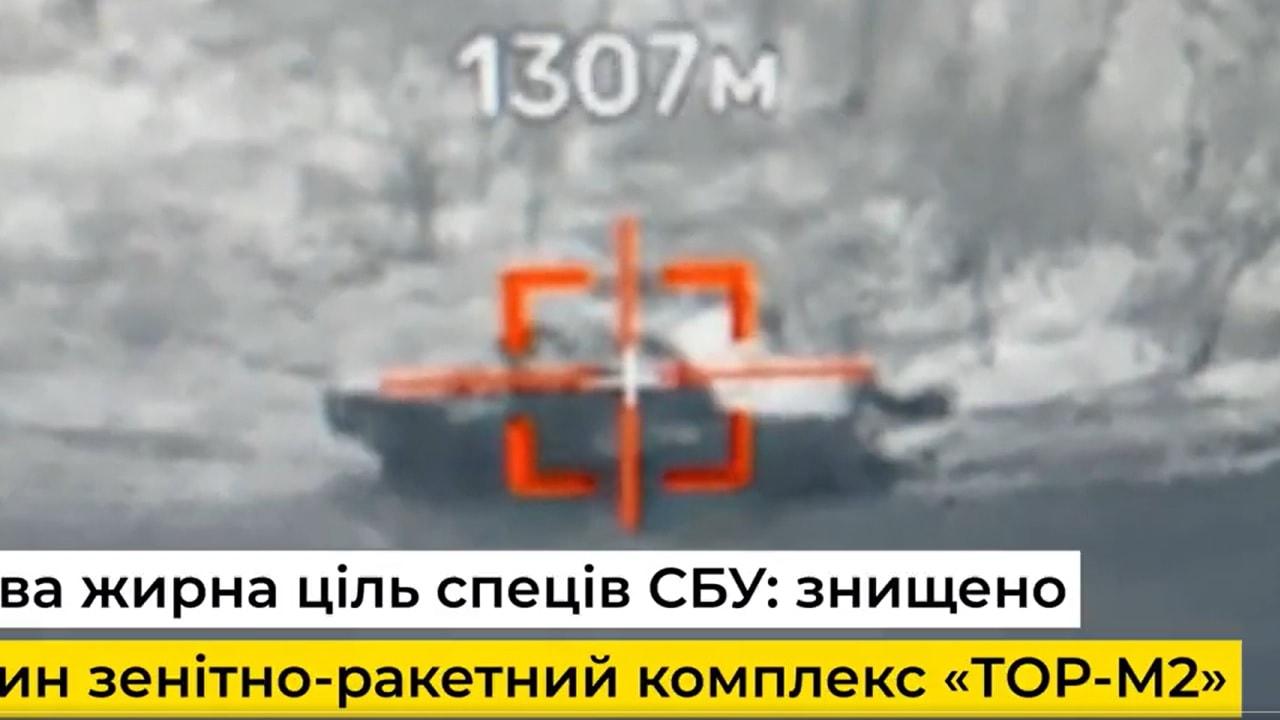Russian officials claimed on Wednesday that Ukraine attempted to assassinate Vladimir Putin via a drone, which was allegedly intercepted directly above the Kremlin. Whether this was a daring attempt to strike at the heart of the Russian government by Ukraine or a false-flag operation by Russia to falsely accuse Kyiv is not yet clear. The one thing that is clear, however, is that the stakes in this war – especially considering Ukraine could be days away from launching a long-promised spring offensive – are rising.
Dramatic video footage appears to show a slow-moving drone flying over the Kremlin and suddenly bursting into flames, with wreckage falling to the ground. The Russian government claims there were two separate drones in the “planned terrorist attack” that took place in the 2AM. hour, Moscow time, both of which “were disabled,” according to TASS. Zelensky quickly denied responsibility, claiming “We don’t attack Putin or Moscow. We fight on our territory.”
Did Ukraine Do It Or Not?
The famed military strategist Sun Tzu declared more than 2,500 years ago that “all war is based on deception.” Never was that truer than in this current war between Russia and Ukraine. It is impossible, for the moment, to positively determine who is lying and who is telling the truth. Ukraine has motivation to launch such an attack and Russia has motivation to stage a false-flag operation. Regardless of which side is telling the truth in this case, however, both sides can be counted on to exploit it to the maximum in the information space.
Even if Kyiv had nothing to do with the drone attacks, their government and military can use the event to bolster the morale of its people and army by showing that their enemy is not safe anywhere and can claim that the Ukrainian government is willing to take the fight to the heart of the Russian state. The claim is not an empty one, as Ukraine has accelerated their efforts of late to take the fight to Russian soil.
In just the past few days, Ukraine has launched drone strikes against two Russian military rail lines, taken out a major oil storage facility in Sevastopol, and on Wednesday struck a second fuel storage facility in Volna, near the Black Sea. On Tuesday, Ukrainian Defense Minister Oleksiy Reznikov claimed that his forces “are entering the home stretch” for the launch of a spring offensive and that “everything is ready.” Russian officials, meanwhile, are issuing ominous warnings of their own.
Following the apparent drone strike on the Kremlin, Deputy Chairman of the Russian Security Council Dmitry Medvedev issued a statement on his Telegram channel claiming that “after today’s terrorist attacks, there are no options left except for the physical elimination of Zelensky and his cabal.” Speaker of the Russian parliament Vyacheslav Volodin warned that “an attack on the president is an attack on Russia,” that now “there can be no negotiations” with Kyiv, and “we will demand” that Russia destroys the Kyiv regime.
The rhetorical battle in the information space between high ranking officials on both sides is likely about to move to the physical battlefield. According to some Russian officials on Wednesday, the offensive that Reznikov warned about may have already begun. The leader of the mercenary group Wagner, Yvgeny Prigozhin, claimed the “active phase” of Ukraine’s offensive may have already started.
“We are seeing increased activity of enemy aircraft, increased activity around the perimeter of, and inside, our front” near Bakhmut, Prigozhin added. Meanwhile, south of Zaporezhia city, pro-Russian political figure Vladimir Rogov told TASS on Wednesday evening that Ukrainian Armed Forces had attacked Russian-backed forces with “armored vehicles and armored personnel carriers, tanks are involved. Mortars and artillery are working at the moment.”
Whether these are more probing attacks or the opening stages of the offensive is not yet clear, but a major Ukrainian attack is likely coming. The big question now, however, is what might happen next? The stakes for Ukraine couldn’t be higher.
If Zelensky’s forces gouge the Russians as they did last fall in the Kharkiv region, Ukraine might improve its position to either seek a negotiated settlement from a stronger position or to buy enough time to build up for future offensives. But if the Russian forces – which have spent many months building elaborate defenses in depth – are able to blunt Ukraine’s drive, Zelensky could be in a worse negotiating position than he is in now, with little prospect for building a new offensive force in anything less than nine months to a year.
What Happens Next?
To succeed, Ukraine will have to conduct the most difficult combat mission there is: conduct a combined arms offensive operation, into the teeth of a mechanized enemy that is well-entrenched, with a hodge-podge of modern and antiquated armor, with limited numbers of troops, who have had minimal training (and many of its experienced troops have been killed or wounded), without any offensive air support, limited air defense missiles, and insufficient quantities of artillery ammunition.
Western leaders and publics wish Zelensky and his forces to have success and have done all they can to supply and train the Ukrainian Armed Forces. The task before them, however, is daunting to say the least. It would be responsible, at this point, for leaders in both Europe and Ukraine to consider alternative courses of action later this summer if this offensive doesn’t end well for Kyiv. A negotiated settlement that preserves Ukraine as a viable political entity in the near term might end up being better than continuing the fight and possibly be forced to negotiate a worse deal later.
A 19FortyFive Contributing Editor, Daniel L. Davis is a Senior Fellow for Defense Priorities and a former Lt. Col. in the U.S. Army who deployed into combat zones four times. He is the author of “The Eleventh Hour in 2020 America.” Follow him @DanielLDavis.

